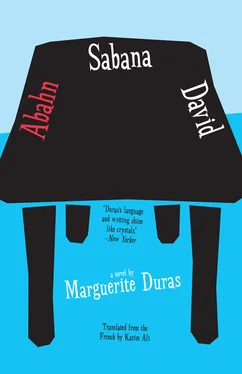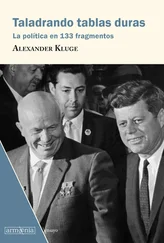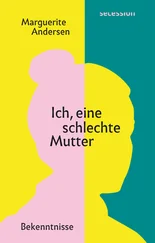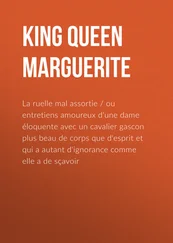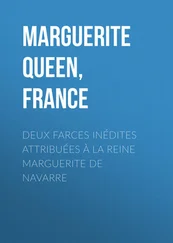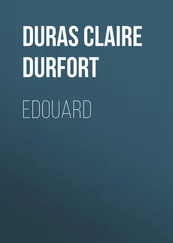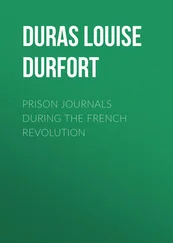“Look, do you think he’s too young?”
“No. He’s already got a gun on him, hasn’t he?” says Abahn.
She turns back to the Jew. Eyes still wide.
“You said something?”
“No.”
Silence.
“Who will kill you?”
The Jew doesn’t answer.
“David?” asks Abahn.
She doesn’t think, just answers:
“Why would David kill the Jew?”
The Jew’s voice comes so softly, one could hardly understand what he said.
She is not looking at him anymore. She repeats:
“Why?”
They do not answer her. She answers herself.
“So that Gringo won’t?”
They still do not answer. She says:
“If it was David who killed the Jew, then who would you say killed the Jew?”
“David,” says the Jew.
She looks at Abahn.
“You heard what he said?”
“Yes.”
“Well, answer him.”
“I say if Gringo kills the Jew, only then would it be Gringo who would have killed the Jew.”
“I say no. I say if it’s David who pulls the trigger, it’s still Gringo who has killed him.”
“No,” says the Jew.
She stands and up and stares them down. Her glare is cutting. She addresses the Jew. “Explain.”
“We can talk about what Gringo said later,” says the Jew in a low voice.
“Later after what?”
“After David has shot the Jew.”
She is silent.
She looks at them, one after another. She pauses, they say nothing. She cries out:
“I want to understand.”
“Do it,” says the Jew. “Understand.”
She sits there, facing him, completely still.
That violent blue stare.
“The merchant’s police have abandoned the Jew to Gringo so he can kill him,” she says, her voice faltering.
“Probably,” says Abahn.
“They are agreed on this. Gringo said to them, ‘Don’t get involved in this, the thing I ask of you.’ ‘Understood,’ said the merchants. And there you go, Gringo and his Jew to kill.”
“Yes.”
The Jew smiles. She does not see. She speaks quickly, “And there is Gringo with his Jew in his grip. And there are the police of merchants just waiting for Gringo to have killed his Jew.”
“No,” says the Jew.
“And there are the tradesmen’s police who are waiting to be able to say: ‘Here is Gringo, the one who killed the Jew.’”
“Yes,” says the Jew. “Like that.”
“And then Gringo who will be able to say: No, the one who killed the Jew is the one named David, a mason from Staadt. You’re mistaken, you’ve been fooled, it wasn’t me, it was David, a mason from Staadt.”
“Like that,” says Abahn.
“An unlucky Gringo?”
“No.”
“An acquaintance of the Jews?”
“Yes.”
Silence.
She walks away. Toward the window. Then a moan of anger, of sadness. She looks through the window at the night, lingering. Then roughly she turns toward the Jews.
“And if it isn’t David?”
They do not answer.
“Who would it be?”
Her question asked, she doesn’t wait for the answer. She answers herself, staring at them:
“It would be nobody, maybe?”
She turns toward him, the Jew, she sits there, before him, in front of him. There’s a moment of clarity — the setting sun pierces the place and illuminates it with yellow light.
“Who are you to create such fear?”
The sun sets.
“Who knows?” says Abahn. “Suddenly out of the blue, one Jew too many?”
“Killed?”
“Yes.”
“The one who upset the merchants?”
“No, because the merchants agreed.”
“Who?”
“The one who agitated the other Jews,” says Abahn.
She wants no more to account for death.
“We speak without understanding,” she says. “It’s so difficult to understand.”
“Yes,” says the Jew.
Abahn walks over to stand next to her. She notices him suddenly.
“Why did you come?”
“I saw someone crying.”
“A Jew.”
“Yes. I know them.”
“Racists are executed here.”
The blue eyes darken.
“I’m a racist,” says Abahn.
They do not take their eyes from one another.
“You’re Abahn the Jew, Abahn the dog?”
“Yes, that’s me as well. Didn’t you recognize me?”
“Yes.” She looks from one to the other. “You’re the one who will not be killed.”
“Perhaps.”
“The one who speaks?”
“I speak for the Jew.”
“The one who sees? The one who will speak?”
“Yes.”
“To whom?”
“To those who see and understand.”
Sabana turns toward David, his eyes closed. She gestures. “And to him as well? The deaf and dumb? And to apes?”
“Them too, yes,” says the Jew.
“Ha!” An explosion of silent laughter mars Sabana’s face.
“We will seek their ears,” says Abahn.
“Their eyes,” says the Jew.
“To understand them,” says Abahn.
“Their conversation,” says the Jew.
Silence.
She looks at them, first one, then the other, then at David. “And the others who are yet to arrive, perhaps?”
“Perhaps,” says the Jew.
“The night is long,” says Abahn. “Long and empty.”
She turns in the direction of the road. “And where did you both come from?”
“From everywhere,” says the Jew.
She takes one step toward the door that leads out to the park. She stops. A last light slides down the walls and goes out.
“They kill them quickly, usually,” she says. “Earlier in the night, on that meadow over there, not indoors. Each time they say: this will be the last one. Yet they always come back, again and again, so it seems.”
“Yes.”
Silence.
They all look at one another.
“You came to destroy our unity.”
“Yes.”
“To introduce disorder and disharmony.”
“Yes.”
“Division, trouble in our unity?”
“Yes.”
She pauses, their eyes always on her. Her returning gaze is vacant, empty.
“To divide and destroy?”
“Yes,” says the Jew.
“And replace it with what?”
“With nothing.”
All at once she moves as if disappearing, as if dying. Her voice quavers as she asks:
“Who has spoken?”
“Me,” says the Jew.
She rises.
She looks at David.
•
“Jeanne is at the meeting,” she says.
“With Gringo?”
“Yes.”
“Gringo is at the meeting?” asks the Jew.
She does not answer right away. “I don’t know.”
“Jeanne is out in the streets, in the meetings, in the streets,” says the Jew. “With Gringo.”
“Yes.”
She is not looking at anyone anymore. She looks out at the darkened street.
“Jeanne is out tonight,” she says.
“Tonight there’s the ice and the desolation,” says Abahn.
“Jeanne is out in the ice and desolation,” says the Jew.
Sabana’s eyes grow wide.
“We’re always afraid,” says Sabana. “We never know what Jeanne does when night falls.”
“You never know exactly where she is?”
“Never,” says Sabana. She pauses. “She tries a little to prevent—” Sabana interrupts herself.
She is still looking out at the darkened road. “I’m afraid,” she says. “With this old—”
“To prevent what?”
“Just a little, the death, here in Staadt.”
Silence.
“He knows that?” asks Abahn, pointing to David.
“No.”
“He doesn’t know?” asks the Jew.
Sabana does not answer.
She turns toward the setting sun.
“She’s young like David,” she says. “Beautiful like David.”
The setting sun reflects in Sabana’s eyes, blue, dark.
“You live with them?”
Читать дальше
